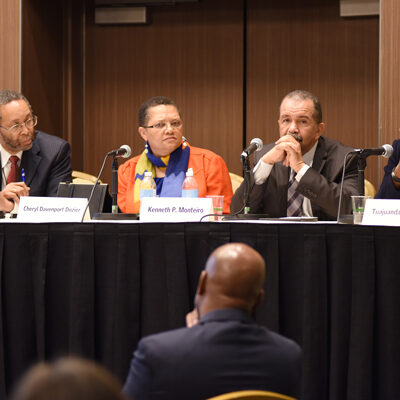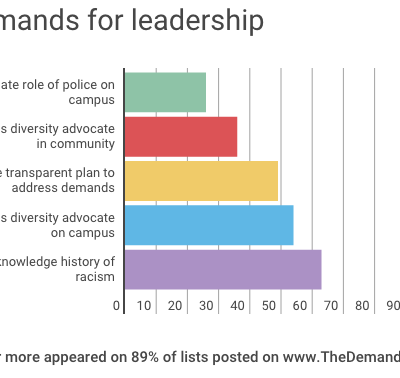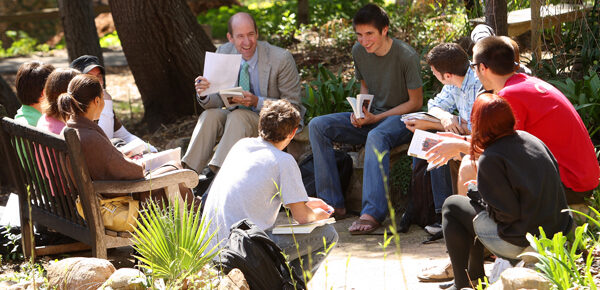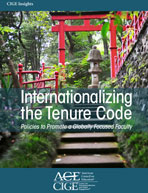Features

Mapping Internationalization 2016: Updates, Improvements and What We Hope to Learn
ACE’s Center for Internationalization and Global Engagement has launched the fourth iteration of our Mapping Internationalization on U.S. Campuses survey, which will build on data we collected in 2001, 2006 and 2011. Robin Helms previews what to expect from the new report.

Reconsidering the Pipeline Problem: Increasing Faculty Diversity
Kimberly A. Griffin writes that a pathway is a better metaphor than a pipeline when considering how to diversify college and university faculty. This is the third in a series sparked by recent student protests and the national dialogue on diversity and inclusion.

Breaking the Cycle
Anne-Marie Nuñez suggests looking to Hispanic-Serving Institutions as a model for how to build an inclusive campus racial climate. Nuñez is an associate professor in the Educational Leadership and Policy Studies Department at the University of Texas at San Antonio. This is the second in a series sparked by recent student protests and the national dialogue on diversity and inclusion.
Hanover Park’s Education and Work Center: Embarking on a Path of Hope
President Obama in 2014 signed the Workforce Innovation and Opportunity Act, which helps ensure that job seekers have access to strategically coordinated education, employment, training and support services. However, in a small town in Illinois, one mayor was already spearheading the kind of strategic planning the federal mandate would soon require. ACE Fellow Kenya F. Ayers takes a look.
Reflections on Advancing Women in Higher Education
ACE has launched a new campaign—Moving the Needle: Advancing Women in Higher Education Leadership—that asks college and university presidents to commit to helping achieve the goal that by 2030, half of U.S. college and university chief executives are women. ACE’s Lynn M. Gangone looks at women’s advancement in higher education leadership in recent years—and the prospects for the future.

What Are Students Demanding?
ACE’s Hollie Chessman and Lindsay Wayt analyze the demands from student organizers across 76 higher education institutions and coalitions. This post is the first in a series sparked by recent student protests and the national dialogue on diversity and inclusion.

A Tenure and Promotion Wish List
For a recent ACE study on how international activities and engagement are rewarded (or not) in the tenure process, Robin Helms analyzed 91 tenure policy documents from 61 U.S. institutions. Putting herself in the shoes of a junior faculty member, she has compiled a wish list for what she would like to see in campus tenure policies and procedures.
Facing Crisis in Faculty Retirement, Institutions Find Creative Solutions
Like other sectors of the U.S. workforce, higher education is facing a looming crisis in retirement as baby boomer faculty plan the next chapter of their lives. ACE’s Jean McLaughlin discusses five key takeaways on faculty retirement, for both institutions and faculty members themselves. This piece is drawn from the recent book, Faculty Retirement: Best Practices for Navigating the Transition.

#EducateVeterans on Student Financial Aid
Since the passage of the Post-9/11 GI Bill in 2009, the United States has spent more than $53 billion to educate over 1.4 million military-connected students. However, a large share of veterans and other military-connected students do not receive VA/DoD education benefits or other financial aid to help pay for college. What can be done to ensure they get the support they need and are entitled to?

A Call to (Open) Arms for U.S. Higher Education
Increasingly, global citizenship is a core enterprise for much of U.S. higher education. But recent events in Beirut, Paris, Tel Aviv and Bamako, amid the ongoing flow of Syrian refugees—and the dark fears they have ignited—feel like a major setback to this endeavor. ACE’s Heather Ward asks how higher education should respond.

Where Have All the Low-Income Students Gone?
Since 2008, an intensive national campaign has sought to boost the number of college graduates. But low-income students are now actually much less likely to enroll in college immediately after high school than they were seven years ago, despite all of the efforts to increase their post-secondary participation. ACE’s Terry Hartle and Chris Nellum discuss this surprising and deeply troubling trend.

The Other 90 Percent: Global Competence for All
In the increasingly globalized world of the 21st century, colleges and universities are recognizing the need to provide students with the knowledge and skills needed to live and work across borders. The big problem, however, is that in the United States, few students ever have this type of experience. Robin Helms looks at the options to give students international experiences beyond study abroad.